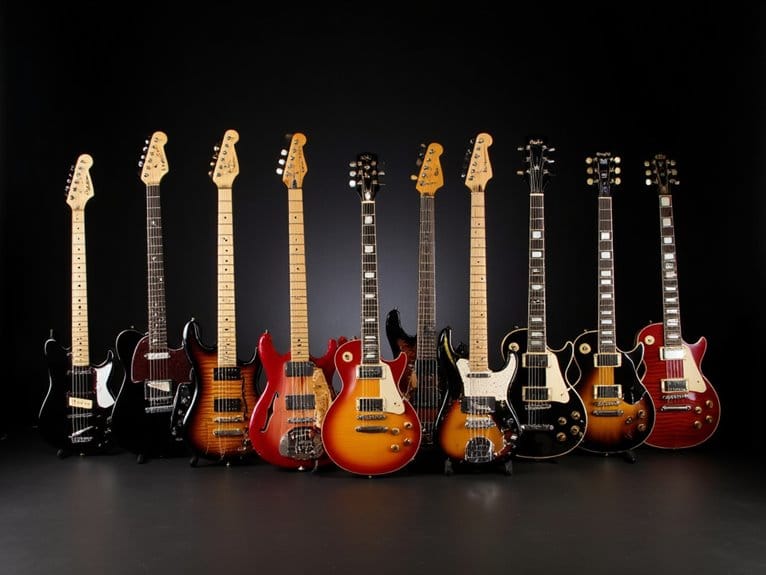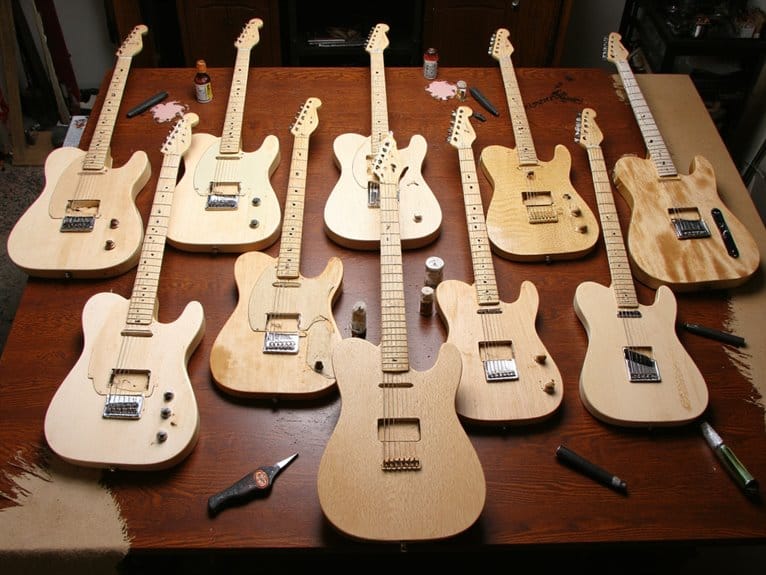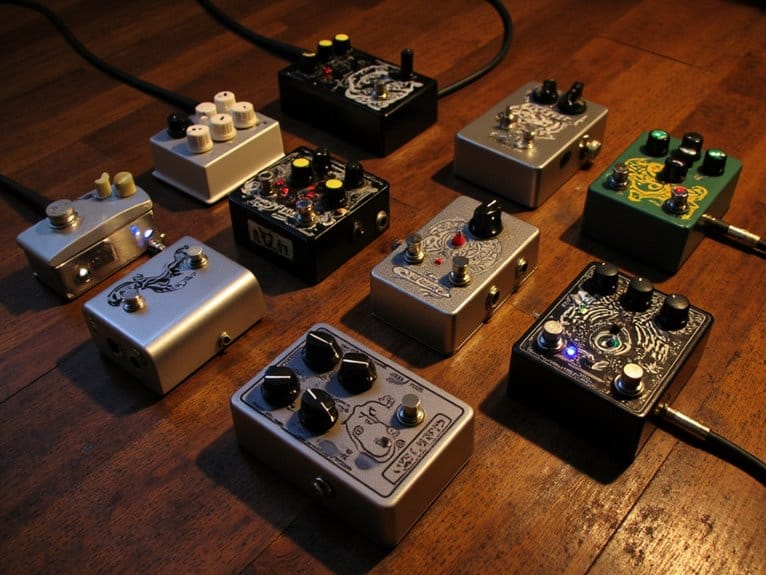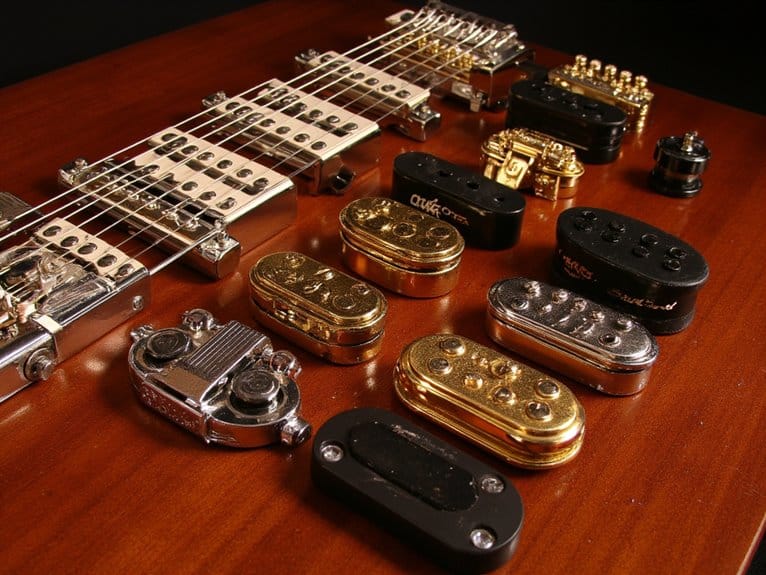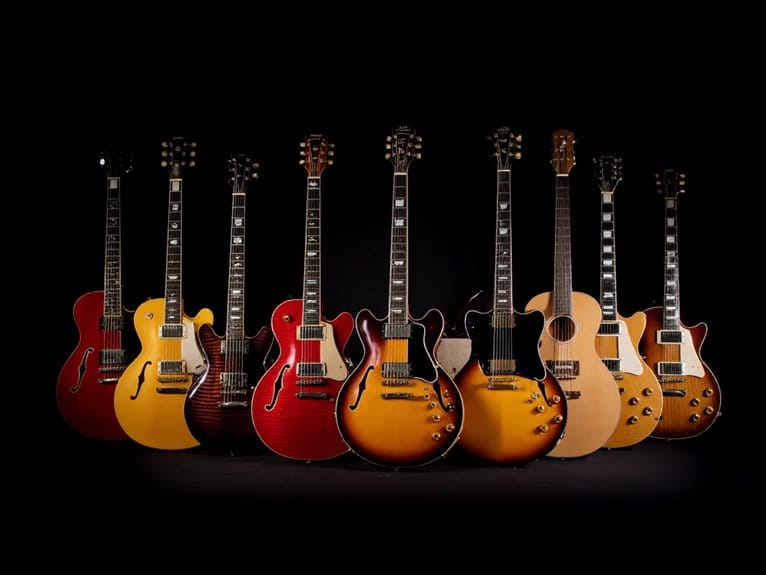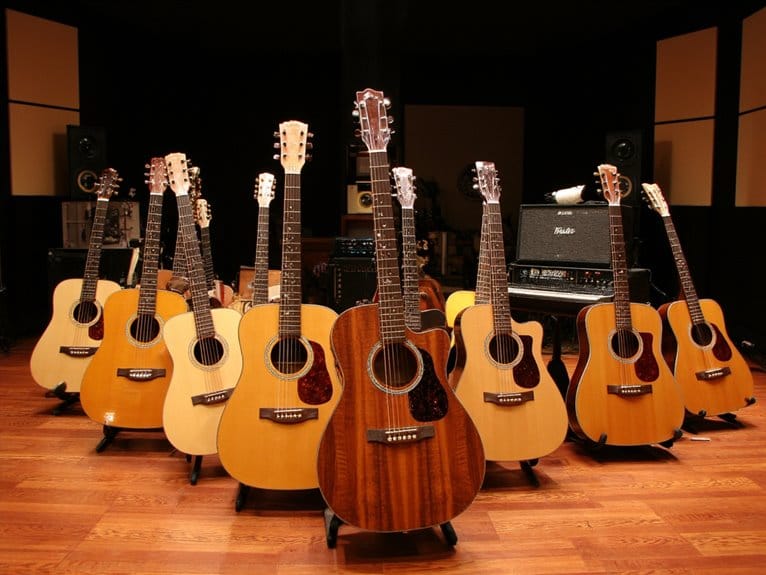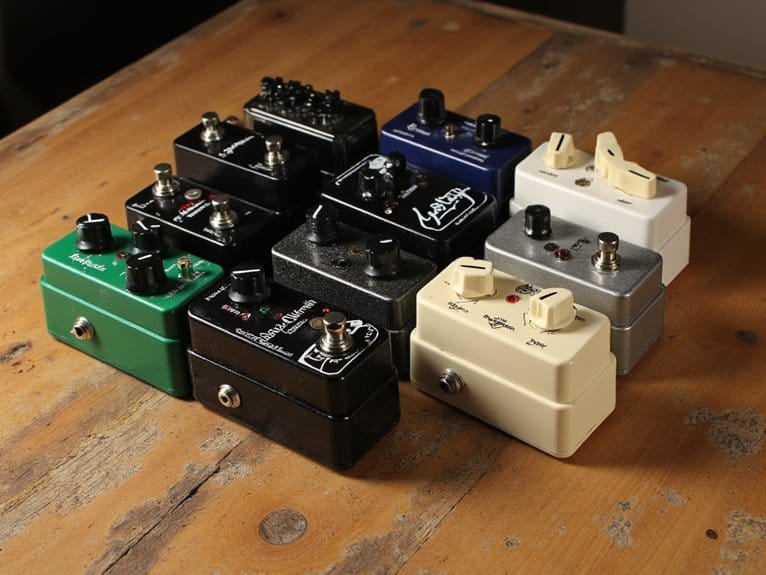Best Affordable 7-String Guitars for Extended Range Playing
I’ve tested dozens of budget 7-strings, and the Jackson JS22-7 Dinky consistently delivers exceptional value with its compound radius fingerboard and graphite-reinforced neck. The Ibanez GRG7221QA offers smooth playability with Infinity R7 pickups, while the RG7221WH provides excellent factory setup and high-output humbuckers. IYV’s ISFF7-400 features reliable CNC machining at an attractive price point, though most models require minor setup adjustments for peak performance. Continue below to discover specific specifications that’ll help you choose the perfect extended-range instrument.
We are supported by our audience. When you purchase through links on our site, we may earn an affiliate commission, at no extra cost for you. Learn more.
Notable Insights
- Jackson JS22-7 Dinky offers excellent value with compound radius fingerboard and complete accessory bundle for beginners.
- Ibanez RG7221WH features high-output Infinity R7 humbuckers and smooth factory setup, ideal for metal playing styles.
- Ibanez Gio GRG7221QA provides lightweight design and affordability, perfect for guitarists transitioning to 7-string instruments.
- All models feature poplar body construction and target beginner to intermediate players exploring extended range capabilities.
Jackson JS22-7 Dinky 7-string Electric Guitar – Satin Black

Budget-conscious metal enthusiasts and aspiring seven-string players will find the Jackson JS22-7 Dinky a compelling entry point into extended-range territory, offering Jackson’s signature aggressive aesthetics and high-output humbuckers at just $160. You’ll appreciate the poplar body’s lightweight 12.96-pound construction, which makes extended playing sessions more comfortable, while the maple neck and amaranth fretboard provide adequate playability for both rhythm work and lead passages. The 12-16 inch compound radius fingerboard facilitates smooth shifts between chord progressions and single-note runs, though you might encounter occasional fret buzz that’s typical at this price point. Customer feedback consistently highlights the guitar’s solid value proposition.
Best For: Budget-conscious metal enthusiasts and aspiring seven-string players looking for an affordable entry point into extended-range guitars with Jackson’s signature aggressive aesthetics and high-output humbuckers.
Pros:
- Exceptional value at $160 with Jackson high-output humbuckers that deliver aggressive tone preferred by metal players
- Lightweight 12.96-pound poplar body construction makes extended playing sessions more comfortable
- 12-16 inch compound radius fingerboard promotes smooth transitions between chord progressions and single-note runs
Cons:
- Occasional fret buzz issues that are typical at this price point
- Tuning pegs may require frequent adjustment affecting tuning stability
- Some customers report aesthetic imperfections and recommend using thicker gauge strings for lower tunings
Ibanez Gio GRG7221QA 7-String – Transparent Black Sunburst

Beginners stepping into extended-range territory will find their perfect entry point with the Ibanez Gio GRG7221QA 7-String, a guitar that bridges the gap between affordability and functionality without the overwhelming complexity of professional-grade instruments. At 7.92 pounds, this poplar-bodied guitar features a quilted maple art grain top that catches light beautifully, while the treated New Zealand Pine fretboard provides surprisingly smooth playability despite its budget positioning. The proprietary Infinity R7 humbucking pickups deliver adequate metal tones straight from the box, though you’ll eventually want pickup upgrades for enhanced sonic versatility and clarity.
Best For: Beginner and intermediate guitarists looking to explore 7-string extended-range playing without breaking the bank, especially those interested in metal genres who want a reliable entry-level instrument with upgrade potential.
Pros:
- Excellent entry point into 7-string territory with smooth playability and low action despite budget pricing
- Beautiful quilted maple art grain top with transparent black sunburst finish that looks more expensive than it is
- Lightweight at 7.92 pounds with good build quality for the price point, making it comfortable for extended playing sessions
Cons:
- Stock Infinity R7 pickups are only adequate and will likely need upgrading for better tone quality and versatility
- Treated New Zealand Pine fretboard may not have the premium feel or longevity of traditional hardwood options
- May require professional setup and intonation adjustments out of the box for optimal performance
Ibanez RG7221WH GIO 7-String Electric Guitar White

The Ibanez RG7221WH stands as a compelling entry point for players ready to explore extended range territory without breaking the bank, offering the signature RG design DNA that’s powered countless metal anthems over the decades. You’ll find the white finish gives this poplar-bodied instrument a clean, professional appearance that’ll look great on stage or in your living room. The maple neck paired with New Zealand Pine fretboard creates smooth playability, while those high-output Infinity R7 humbuckers deliver the fat, distorted tones you’re craving for heavy riffing. At 9.07 pounds with a 25.5-inch scale length, it’s comfortable enough for extended playing sessions, and the factory setup means you can start shredding right out of the box.
Best For: Beginner to intermediate guitarists looking to explore 7-string extended range playing with a reliable, affordable instrument that delivers solid metal tones and professional appearance.
Pros:
- Excellent value under $600 with high-quality factory setup and smooth playability straight out of the box
- High-output Infinity R7 humbucking pickups provide fat, distorted tones perfect for heavy music and low tunings
- Lightweight 9.07-pound poplar body with comfortable 25.5-inch scale length ideal for extended playing sessions
Cons:
- New Zealand Pine fretboard material may not offer the premium feel of ebony or rosewood found on higher-end models
- Some users report occasional fret buzz issues requiring truss rod adjustments
- Limited to single pickup configuration (H) which reduces tonal versatility compared to multi-pickup guitars
IYV 7 String, Right, Charcoal Sunburst (ISFF7-400)
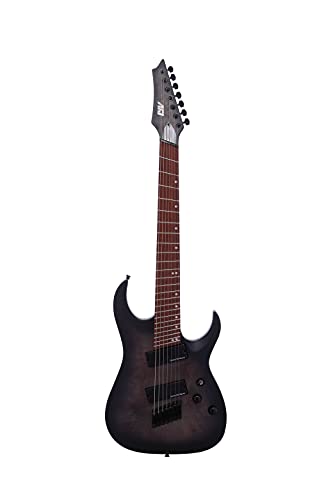
IYV’s approach to affordable seven-string guitars centers on precision manufacturing through CNC machining, which delivers consistent quality that I’ve found particularly appealing for players who want reliable performance without breaking the bank. The ISFF7-400’s charcoal sunburst finish provides visual appeal while the computer-programmed construction guarantees minimal neck defects, though you might encounter occasional fret buzzing that requires simple maintenance hammering. I’ve noticed the pot holes sometimes need widening for proper knob fit, a minor adjustment that’s easily manageable for most players seeking extended range capabilities without premium pricing.
Best For: Budget-conscious guitarists seeking a reliable seven-string instrument with consistent build quality who don’t mind performing minor maintenance adjustments.
Pros:
- CNC machine construction with computer programming ensures consistent quality and minimal neck defects
- Affordable pricing makes seven-string guitars accessible without premium costs
- Charcoal sunburst finish provides attractive visual appeal
Cons:
- May experience fret buzzing that requires maintenance hammering to fix
- Pot holes sometimes need widening for proper knob fit
- Requires minor adjustments that some players may find inconvenient
Jackson Dinky JS22-7 Electric Guitar Bundle (Satin Black)
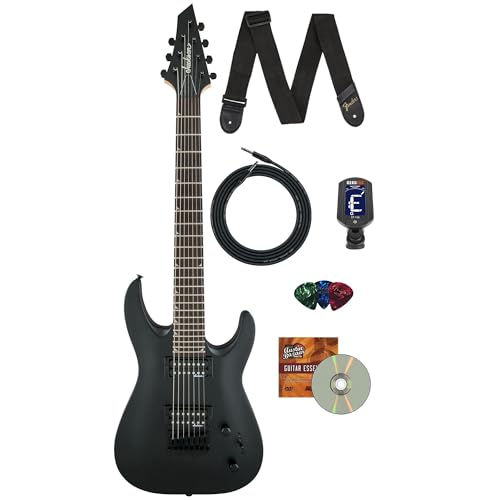
Jackson’s Dinky JS22-7 strikes an impressive balance between extended range capabilities and budget-friendly pricing, making it an ideal entry point for guitarists ready to explore seven-string territory without breaking the bank. You’ll appreciate the 26.5-inch scale length that delivers improved low-end articulation, while the compound 12-16 radius fingerboard accommodates everything from heavy riffs to intricate lead work. The poplar body with arched top provides lightweight resonance, and the bolt-on maple neck features graphite reinforcement for stability. Jackson’s high-output humbuckers handle modern metal tones effectively, though you might consider upgrading the electronics eventually. The complete bundle includes essential accessories like cables, tuner, strap, and picks.
Best For: Guitarists ready to explore seven-string territory who want an affordable entry point into extended range playing without sacrificing essential features like compound radius fingerboard and high-output pickups.
Pros:
- Complete bundle includes all essential accessories (cable, tuner, strap, picks) plus instructional DVD for immediate playability
- 26.5-inch scale length and compound 12-16 radius fingerboard provide excellent versatility from heavy riffs to intricate lead work
- Lightweight poplar body with arched top and graphite-reinforced maple neck deliver good resonance and stability at a budget-friendly price
Cons:
- Electronics may need eventual upgrading as the high-output humbuckers are adequate but not exceptional
- Some manufacturing inconsistencies reported including off-center bridge placement issues
- Seven-string complexity makes it unsuitable for absolute beginners who should start with six-string guitars
Factors to Consider When Choosing an Affordable 7 String Guitar
When I’m evaluating affordable 7-string guitars, I focus on five critical factors that determine whether you’ll get genuine value or end up with an instrument that frustrates your playing experience. The pickup configuration affects your tonal versatility, while neck construction quality directly impacts playability and long-term stability, and I’ve learned that compromising on either usually leads to buyer’s remorse. Scale length, bridge system design, and wood material choices round out the essential considerations, each influencing everything from string tension to sustain characteristics in ways that separate worthwhile budget instruments from expensive disappointments.
Pickup Configuration Options
Since pickup configuration fundamentally shapes your 7-string guitar‘s sonic personality, I’d argue it’s one of the most critical decisions you’ll make when shopping for an affordable extended-range instrument. You’ll typically encounter HSS setups, which combine humbucker warmth with single-coil brightness, or H-H configurations that deliver aggressive power for metal and rock. I’ve found HSS particularly versatile for players spanning multiple genres, while H-H excels when you’re focused on heavier styles. Coil-splitting features add another dimension, allowing you to switch between humbucking and single-coil sounds within the same pickup. Your choice directly impacts tone, sustain, and dynamics, so consider your primary playing style carefully before committing to any configuration.
Neck Construction Quality
The foundation of any exceptional 7-string guitar lies in its neck construction, and I’ve learned through years of testing that this component can make or break your playing experience, especially in the affordable price range. I prioritize maple necks for their strength and stability, which becomes essential when dealing with the additional string tension that 7-strings demand. The truss rod adjustability can’t be overlooked either, as it allows fine-tuning for different string gauges and playing styles that extended range guitars often require. I’ve found that bolt-on neck joints offer practical advantages in budget instruments, providing easier maintenance and potential repairs. Scale length considerations, typically 25.5 inches or longer, help maintain proper string tension for those low B tunings.
Scale Length Importance
While neck construction forms the structural backbone, scale length becomes the defining factor that determines how your 7-string guitar will respond under your fingers, particularly when you’re pushing those lower frequencies to their limits. I’ve found that most affordable 7-strings fall between 25.5 and 27 inches, and this choice dramatically affects playability. Shorter scales offer easier string bending and reduced finger tension, making them beginner-friendly, while longer scales provide that snappy response and tonal clarity that really makes drop-tuned passages cut through a mix. The longer scale lengths excel at tightening up the low end and enhancing brightness in those vital low frequencies, which I consider essential for heavy genres requiring precise articulation.
Bridge System Types
Beyond scale considerations, bridge systems represent another fundamental choice that’ll shape your 7-string experience, and I’ve learned through countless setups that this decision affects everything from your daily tuning routine to your long-term maintenance costs. Fixed bridges offer superior tuning stability and simpler maintenance, making them ideal for beginners who don’t want to wrestle with complex adjustments. Tremolo systems provide pitch-bending capabilities but require more frequent tuning corrections, which can frustrate players who prioritize reliability over effects. I always recommend compensated bridge designs since they improve intonation across the fretboard, ensuring your low B string stays in tune at higher positions. Bridge materials matter too-steel delivers brighter tones while aluminum provides warmth, though both handle the string tension admirably.
Wood Material Choices
After testing dozens of affordable 7-strings over the years, I’ve discovered that wood choices greatly impact both your playing experience and long-term satisfaction, yet many players overlook these fundamentals in favor of flashier features. Body materials like poplar, basswood, and mahogany offer warm, balanced tones that work across genres, while neck woods affect playability remarkably-maple delivers brightness and sustain, mahogany adds warmth and resonance. I’ve found fingerboard materials equally important; treated New Zealand pine provides decent feel, but rosewood offers smoother playability with enhanced warmth. The solid versus laminated debate matters too, though I’ll admit laminated options often surprise me with their quality-to-price ratio, even if solid wood delivers richer tones for those willing to invest more.
Setup Requirements Needed
When you bring home an affordable 7-string guitar, expecting it to play perfectly out of the box is often wishful thinking, as most budget models require some degree of professional setup to reach their full potential. I’ve learned that neck relief, string height, and intonation adjustments are typically necessary for maximum playability. You’ll want to check pickup heights carefully, since different pickup types respond variably to the extended range’s string gauges. I recommend upgrading to heavier gauge strings immediately, as they’ll improve tuning stability and sustain, especially in lower tunings. Don’t overlook the bridge configuration either-misaligned bridges cause tuning headaches. Finally, inspect the fretwork thoroughly, since budget models often have leveling issues that affect performance until professionally addressed.
On a final note
After testing these affordable 7-string options, I’ve found that you don’t need to break the bank for extended range capabilities. The Jackson JS22-7 consistently delivers professional playability at $299, while the IYV ISFF7-400 offers surprising versatility for beginners. Remember, I always recommend trying before buying when possible, but any guitar from this list will get you exploring those lower registers without emptying your wallet or sacrificing essential build quality.

